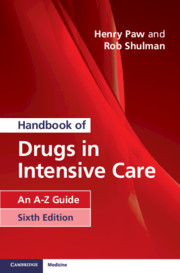Chapter C - Chapter
from Drugs: An A–Z Guide
Published online by Cambridge University Press: 18 July 2019
Summary
Carbocisteine affects the nature and amount of mucus glycoprotein that is secreted by the respiratory tract. It is a well-tolerated treatment with a favourable safety profile that provides symptomatic relief to some patients with sputum production in COPD. It can be used in the ICU to treat mucous plugging as an alternative to saline or acetylcysteine nebulization. In addition to its mucoregulatory activity, carbocisteine exhibits free-radical scavenging and anti-inflammatory properties. There is a theoretical risk of gastric erosion because carbocisteine may disrupt the gastric mucosal barrier. Peak serum concentrations are achieved at 1–1.7 hours and the plasma half-life is 1.3 hours. It achieves good penetration into lung tissue and bronchial secretions. It is excreted in the urine as unchanged drug and metabolites.
- Type
- Chapter
- Information
- Handbook of Drugs in Intensive CareAn A-Z Guide, pp. 44 - 78Publisher: Cambridge University PressPrint publication year: 2019



